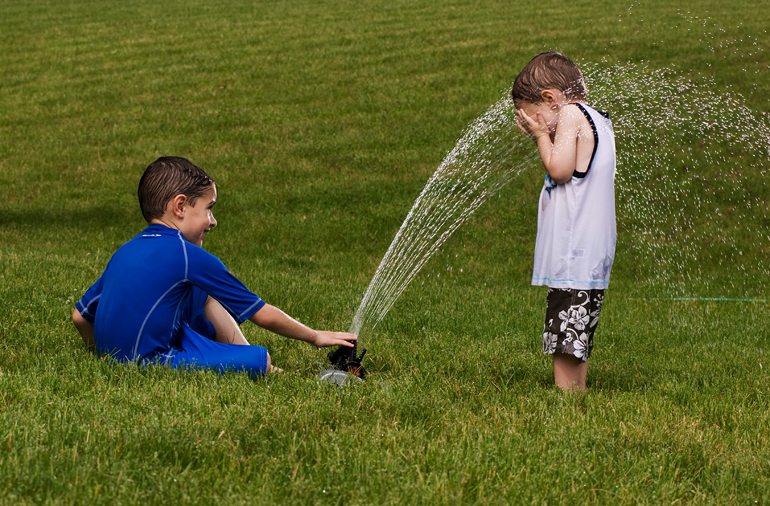
Did you ever wonder how one house in Millbury can have a lush, beautiful lawn while their neighbor's is patchy and full of weeds? While I never had a nice lawn, I did in fact have plenty of excuses: not enough time, not enough patience, not enough money, not enough equipment... but what I didn't have (and really needed) was information. As with anything from lawn care to photography, it isn't about the equipment - it is the knowledge of how to use it that matters.
Here are some tips I've accumulated (mostly from knowledgeable people on The Garden Web forums who were willing to share) that I've found work well in our climate and most importantly won't cost you in money or time compared to what you probably already are doing.
The big picture. Each aspect of this plan is designed with one goal in mind: to tip the balance in favor of growing the grass you want and away from growing the weeds you don't.
Mow it long! Next time you mow, set the height adjustment of your mower as high as it will go. Good, now leave it there! Mowing long does a lot of good things: long grass will help retain moisture in the soil longer, it encourages roots to grow deeper, and most importantly, it crowds out new weeds from getting a grip and growing in your lawn better than short grass does. If the grass isn't too high, mulch-mowing is great for your soil too.
Water it deep! Your lawn really only needs about 1-2" of water a week (including rain). The key is for it to get it all at once. When needed, first thing in the morning water the patch of lawn your sprinkler(s) can reach for an hour or so straight. Good, you're done in that area for the week, at least. Watering deeply encourages roots to grow deeper. Watering only once a week (and in the morning before the sun gets hot) allows the water to sink in deep (to where the roots of your grass are) and THEN the surface soil to dry out a bit during the sunny part of the day, making it harder for errant weed seeds landing there to germinate. Since your grass isn't wet very long this way, it also keeps disease to a minimum.
The Cycle: When it comes to the stuff you put on your lawn, it isn't about the brand or even the type (organic or traditional) of fertilizers and chemicals you use, it is the process. In a nut shell, it goes like this: add new seed over the top of your existing lawn (called "overseeding") in the early fall (think late August / early September), fertilize a few weeks later (to feed the grass when it needs it), and use weed-preventing fertilizer in the Spring (think March, before you see crab grass popping up). Fall overseeding gives you more grass and Spring pre-emergent weed prevention keeps the weed seeds from germinating while the grass you planted in the fall has a chance to thicken up. Since most weeds (including crab grass) die at the first sign of frost, you can imagine that if you do this a few years in a row, every year your grass will become better and weeds get competed away (without using nasty weed-killing chemicals) - but you have to stick with it. Don't miss a step or put it down 2-months too late or you'll be starting over from the beginning.
Benefits of going organic: Around 2006, I went organic with my lawn care and have never looked back. While the safety of putting non-toxic stuff where the kid-o's play was certainly a draw, I did it because it is actually more difficult for me to screw up. In short, organic fertilizers work by feeding the bugs and microbes living in your soil, who in-turn feed your lawn. You can put down your fertilizer a month too early and it doesn't matter: the little buggers won't eat until they are ready then your lawn gets fed right when it needs it. You can't burn your lawn by over-fertilizing. The critters eat as much as they want to eat and again, your lawn gets what it needs. Just remember, you need those bugs to make it all work, so no more insecticides - but once you're on-board, there are organic solutions to nearly every problem (for example, I'm a big fan of using Milky Spore for grub prevention)! Depending on what you buy, organics can be slightly more expensive than chemical fertilizers, but you can use the money you save by not needing weed and bug killing chemicals to make up the difference.
Buy locally and support your community: If you do decide to give organics a try, you can find fall fertilizer as well as springtime pre-emergent weed preventing fertilizer (look for "corn gluten meal" on the label) from Roger's Farm and Garden Supply right in town or Worm's Way, just over the Sutton line.
What to do if your neighbor's lawn looks like mine used to and is threatening all of your hard work? Send 'em a link to this page for some info! Let's see if we can refine the look of an already great town one front yard at a time.



